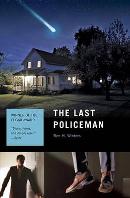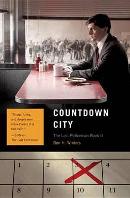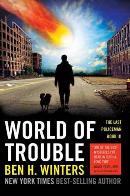 This original and exciting police-procedural trilogy poses ethical and moral dilemmas as the end of the world draws near.
The Edgar-Award-winning first novel in this series, The Last Policeman, introduces us to Henry (Hank) Palace, a recently promoted detective in the North Hampshire Police Department in Concord. It’s March when the story begins, and in October the six-kilometre-wide asteroid known as Maia will collide with Earth, obliterating human life on the planet.
Hank’s promotion has been accelerated by the disappearances, resignations and suicides of fellow police reacting in their own ways to the coming apocalypse. Hank’s own method of coping is simply to keep going. Stoical, rather humourless, he takes his job more seriously than he does the fact of impending doom and stubbornly soldiers on, obeying all the rules, despite the cynicism and negativity of the people around him:
This original and exciting police-procedural trilogy poses ethical and moral dilemmas as the end of the world draws near.
The Edgar-Award-winning first novel in this series, The Last Policeman, introduces us to Henry (Hank) Palace, a recently promoted detective in the North Hampshire Police Department in Concord. It’s March when the story begins, and in October the six-kilometre-wide asteroid known as Maia will collide with Earth, obliterating human life on the planet.
Hank’s promotion has been accelerated by the disappearances, resignations and suicides of fellow police reacting in their own ways to the coming apocalypse. Hank’s own method of coping is simply to keep going. Stoical, rather humourless, he takes his job more seriously than he does the fact of impending doom and stubbornly soldiers on, obeying all the rules, despite the cynicism and negativity of the people around him:
… and even though I’m a policeman and even though there are no other cars at the intersection, I stop and I drum my fingers on the steering wheel and I wait for the green light …
The novel begins in typical police-procedural style, with the discovery of a hanged man (Peter Zell), presumed to be a suicide by everyone except Hank, and we are not aware until several pages in that there is anything else happening. Then small glimpses start to appear that tell us all is not as usual, until the asteroid’s imminence is revealed. Peter Zell had been an actuary in one of the few insurance companies still operating since the announcement of the asteroid strike. He had been obsessed by reports of the asteroid and he’d told several people that if he killed himself it would be in the privately operated McDonald’s (the franchise itself has gone bankrupt), where, in fact, his body is found. No one can understand why Hank wants to investigate the case – Concord is, after all, known as ‘Hanger Town’ these days. And really, why bother complicating things when the world is ending? But in the best detective tradition, Hank perseveres. Along the way he has to deal with drug dealers, possible insurance fraud, a very short-lived love affair and his sister, Nico, whose husband Derek has gone missing. Nico and Derek are among the cataclysm-deniers who suspect a government conspiracy to save some elite human lives, and Derek turns out to have been imprisoned by the army for driving an ATV onto federal land, trying to find the secret plans. Although this is to some extent a sideline in the first book, it will become more important as the series goes on, centrally so in the last volume. The detective elements, the threat of disaster and the laconic first-person narration by Hank are all excellently written and plotted, but what makes this book, and the whole trilogy, stand out is the central question, which is not ‘Why does it matter, when the world will soon end?’ but ‘Why shouldn’t it always matter, whatever might happen?’ As Hank admiringly says, observing a doctor flawlessly performing an autopsy, the important thing is ‘… perseverance in this world, despite it all, of things done right’. Many people in The Final Policeman persevere, but many don’t – the cops who go on the ‘Bucket List’, abandoning their jobs to chase dreams they’ve always wanted to fulfil; the self-indulgent who embrace an excess of everything now they haven’t got much time left; the amoral who no longer fear long-term consequences of various forms of self- and other-abuse; the weak and frightened who turn to delusional religious sects; the criminals who exploit every chance for a quick and dirty reward, and the suicides. Countdown City, the second book in the trilogy and the winner of the Philip K Dick Award, finds Hank without a job – the NHPD has been disbanded and turned over to federal control – but still with a mission. His brief here is to help his old babysitter, Martha Cavatone, find her missing husband. But this is more complicated than it used to be. The usual lines of communication have also broken down:
Countdown City, the second book in the trilogy and the winner of the Philip K Dick Award, finds Hank without a job – the NHPD has been disbanded and turned over to federal control – but still with a mission. His brief here is to help his old babysitter, Martha Cavatone, find her missing husband. But this is more complicated than it used to be. The usual lines of communication have also broken down:
There is no way to put out a description on the wires, to issue an APB or post to the FBI Kidnappings and Missing Persons List … There is no way to access federal or local databases. As of last Friday, in fact, southern New Hampshire appears to have no electricity whatever.
Things have hotted up since The Last Policeman. There are now only 77 days to go until Maia hits and catastrophe immigrants (CIs) are flooding into America. The tone of Countdown City is darker and more ominous as (most) people realise the disaster really can’t be averted. Hank is literally racing against time here with electricity and electronic links unavailable, petrol running out (he’s got a bike) and increasingly feral behaviour from the populace. He and Nico, his sister, travel to the former University of New Hampshire, which has now seceded from the USA and become a closed community, some of whose members are involved in firearms transactions. From there, in search of Brett Cavone, they go to an abandoned station near Portsmouth Harbour where remnants of the Coast Guard are trying to prevent refugees from landing and are killing them en masse. They find Brett, and they also find that Martha and her father are involved in a UFO cult that promises escape from the asteroid. Meanwhile, Nico has her own agenda and is still privately pursuing the possibility of intervention in the catastrophe and her belief in the existence of conspiracies that keep the general populace in ignorance. The last book, World of Trouble, begins with Hank holed up in the ‘Police House’ sanctuary with other ex-cops and their families as they live out the final weeks before impact. But he can’t stay there – Nico is missing and he knows she’s still involved with a survivalist cult and on the same improbable mission to save the world. She and her group intend to free an imprisoned scientist whom they believe has the means to deflect the asteroid. Hank needs to find her before the end, by now only days away.
He sets off — with the thief Cortez, who has his own reasons for leaving, his dog Houdini, their two bikes and a wagon containing medical and other supplies — to the old police station he believes Nico is heading for. Along the way they encounter the predictable remnants of a society in chaos – armed gangs, guarded enclaves, survivalists – and they designate the townships they pass through in terms of colour: a green town is where the inhabitants carry on their lives as closely to normal as possible, still disposing of their rubbish, raking their leaves, participating in neighbourhood activity; a blue town is one on the edge and liable to explode; a red town is disintegrating, closely verging on self-destruction and a black town has crossed the line into chaos and violence. Although these are familiar tropes in apocalyptic fiction, they are described in Hank’s impassive voice in a way that brings the decaying civilisation into sharp focus while at the same time revealing the ambiguities and absurdities of human behaviour under extreme stress. Not everyone in this lost world has succumbed to the baser instincts: for example, there are the two reunited lovers who drink beer, play loud music and barbeque their carefully rationed stolen chickens in their cosy campsite and there is the peaceful Amish community, living in apparently blissful ignorance of the approaching catastrophe.
There’s just time for Hank to try to find his sister and to attempt to solve one last case – a murder (many murders, as it turns out). There are no jails left, no recognised law-enforcement agencies, but for Hank solving a homicide still ‘serves society by restoring the moral order …’ though he adds:
The last book, World of Trouble, begins with Hank holed up in the ‘Police House’ sanctuary with other ex-cops and their families as they live out the final weeks before impact. But he can’t stay there – Nico is missing and he knows she’s still involved with a survivalist cult and on the same improbable mission to save the world. She and her group intend to free an imprisoned scientist whom they believe has the means to deflect the asteroid. Hank needs to find her before the end, by now only days away.
He sets off — with the thief Cortez, who has his own reasons for leaving, his dog Houdini, their two bikes and a wagon containing medical and other supplies — to the old police station he believes Nico is heading for. Along the way they encounter the predictable remnants of a society in chaos – armed gangs, guarded enclaves, survivalists – and they designate the townships they pass through in terms of colour: a green town is where the inhabitants carry on their lives as closely to normal as possible, still disposing of their rubbish, raking their leaves, participating in neighbourhood activity; a blue town is one on the edge and liable to explode; a red town is disintegrating, closely verging on self-destruction and a black town has crossed the line into chaos and violence. Although these are familiar tropes in apocalyptic fiction, they are described in Hank’s impassive voice in a way that brings the decaying civilisation into sharp focus while at the same time revealing the ambiguities and absurdities of human behaviour under extreme stress. Not everyone in this lost world has succumbed to the baser instincts: for example, there are the two reunited lovers who drink beer, play loud music and barbeque their carefully rationed stolen chickens in their cosy campsite and there is the peaceful Amish community, living in apparently blissful ignorance of the approaching catastrophe.
There’s just time for Hank to try to find his sister and to attempt to solve one last case – a murder (many murders, as it turns out). There are no jails left, no recognised law-enforcement agencies, but for Hank solving a homicide still ‘serves society by restoring the moral order …’ though he adds:
But society is dead. Civilization is burning cities, its terrified animals clustered around grain silos, stabbing each other at burned-down convenience stores for the last can of Pringles.
… Nevertheless – even so – here I go …
The series does need to be read in order. The last two books suffer slightly from the fact that the excitingly fresh and original pre-apocalyptic scenario of The Last Policeman is already established and by now familiar. But they hold their own, with riveting detective plots, beautifully depicted detail and convincing characters, while the inevitability of the catastrophe adds dark colour and depth as civilisation as we know it inexorably recedes. Hank is a truly existential protagonist – not particularly charismatic, not super-heroic, just an ordinary chap, subject to his own terrors and regrets, doing the best he can, given the circumstances: ‘I want answers is all that I want.’ And apart from the great pleasure of good stories well told, the novels set up some important existential conundrums: What does it mean to be human? Are morality and decency circumstantial or absolute? Is the now more important than the hereafter? The trilogy doesn’t necessarily offer answers but the reader is left wondering about the questions long after the books are finished. Ben H Winters The Last Policeman Quirk 2012 PB 288 pp $22.99 You can buy this book from Abbey’s here or from Booktopia here. Ben H Winters Countdown City: The Last Policeman Book II Quirk 2013 PB 288pp $19.99 You can buy this book from Abbey’s here or from Booktopia here. Ben H Winters World of Trouble: The Last Policeman Book III Quirk 2014 PB 320pp $25.95 You can buy this book from Abbey’s here or from Booktopia here. To see if these books are available from Newtown Library, click here.Tags: Ben H | Winters, police procedural, SFF
Discover more from Newtown Review of Books
Subscribe to get the latest posts sent to your email.







you’ve hooked me
xf